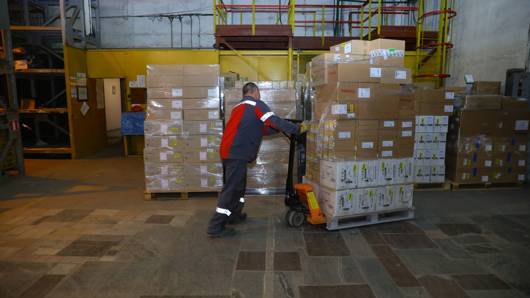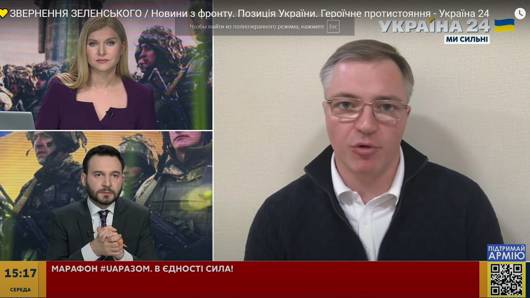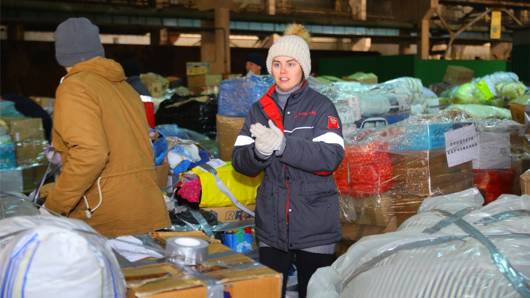The CEO of Metinvest predicts the collapse of the Russian economy as a result of the war in Ukraine and explains why the steel mills in Mariupol will never operate under occupation.
The shelling and invasion by Russian troops has created a humanitarian catastrophe in Mariupol. The war has had an impact on Ukrainian industry and the economy, as well as on the situation in the Russian Federation and the world. However, the Group is confident that Ukraine will prevail and will be able to recover quickly, while retaining its share of the European market.
Metinvest CEO Yuriy Ryzhenkov talked about this and much more in his interview with journalist Tigran Martirosyan on the Ukraine 24 Youtube channel.
– Could you believe that something like this would ever happen?
– Never. I still can’t believe it’s actually happening. Just a few months ago, we were discussing our projects to reconstruct and decarbonise our enterprises in the very same Mariupol… I can’t wrap my head around this.
At the very beginning, when the war started, we stopped the mills, opened our bomb shelters for everyone in the city and prepared supplies of water and food in advance. Now that the city is under siege, we sometimes are able to get in touch with our staff. We know from them that the humanitarian situation in the city is deteriorating every day, food and water have practically run out, and the green corridor has never worked. Each time it has been disrupted by members of the Russian army. People leave the city at their own risk. What is happening now in Mariupol is a huge humanitarian tragedy.
– Have you managed to evacuate many of your employees?
– We have set up a special hotline for them where they can contact us when they leave Mariupol, so that we can help them and keep a record of those who have left. As of today, the hotline has 5,000 employees registered, just over 10% of our total number of people who were in the city at the beginning of this month.
– So, the need for evacuation remains?
– Absolutely. After all, we are talking not only about those people for whom we have arranged more than 6,000 places in Zaporizhia, Kryvyy Rih, Kamianske, and Pokrovsk, and who are already safe. We are also talking about those people who are in the so-called grey zone. Our representatives work there too, we have opened summer guesthouses there and are providing people with first aid, including psychological assistance.
– Tell us about the humanitarian hub in Zaporizhia. What exactly does it do?
– We have organised a two-stage system of providing aid. There is a humanitarian hub that we opened on the base of Metinvest Poland. Metinvest, together with DTEK and the Rinat Akhmetov Foundation, purchases and collects humanitarian aid sent by European countries. There, it gets collected and sent to Zaporizhia, to the humanitarian headquarters at Zaporizhstal, where it is sorted, packed in kits and sent to cities where we are able to deliver it. Of course, first of all, we try to help the cities which have been blockaded, we have managed to deliver the aid to Polohy, Enerhodar, we managed to deliver it to Berdyansk and distribute it there to internally displaced people from Mariupol. This is how our headquarters works and it is quite effective.
– Can you tell us what is in the humanitarian cargo that comes from other countries? How much aid are we getting now from abroad?
– We have delivered 117 tonnes of essential goods from Poland - long-life food, medical supplies - and another 300 tonnes are still on their way. From the centre in Zaporizhia, where we sort not only European aid, but also what we buy in Ukraine, more than 1,000 tonnes of aid has already been sent to people.
– Plants in Mariupol and Zaporizhia are currently out of operation, but what about the others?
– Kamet Steel in Kamianske is operating at almost full capacity (80%), the Kryvyi Rih GOKs are operating at 35-40% capacity, and mainly for the supply of products for our European partners: they met us halfway and almost doubled their orders for the month of March. The Pokrovske Coal Company is also operating. And, of course, our enterprises abroad are working.
– As far as I know, some of your enterprises have been converted to help the army?
– In fact, all of our facilities are providing aid to Ukraine. Moreover, we transfer metal so that our contractors and partners can also make anti-tank obstacles and chains at their enterprises. Since the beginning of the Russian aggression, we have transferred over 40,000 hedgehogs and over 10,000 special spiked chains against wheeled vehicles to the AFU. We have also mastered the production of armour plates for body armour at our facilities, and to date we have transferred over 2,000 such plates. They have already been used to produce body armour for the Armed Forces of Ukraine, the territorial defence forces and the National Police. We also bring in aid purchased abroad, mainly helmets, first-aid kits and body armour.
– Speaking now about the territory where shelling and bombing are taking place, the key problem is logistics, or more precisely the breaking of logistical chains. How are you managing it?
– That's absolutely correct. Ukrainian steelmaking was based on access to seaports. The main supplies of steel went through the ports of Mariupol and the Black Sea, while ore was shipped through the port of Yuzhny and TIS. Unfortunately, many of these ports have now been seized, many are on the verge of being seized, and the routes from these ports are blocked. This has greatly undermined our logistics. Now we are looking at the restart of Zaporizhstal, and we understand that our main concern is how to bring in the coal and how to export the finished products. In these matters we work very closely with Ukrainian Railways, because here we see how the interests of the company are perfectly aligned with the interests of the country. Our task is to find a solution for the logistics problem and restart the Ukrainian economy.
– Of course, because metallurgy is an export-oriented industry. I spoke to Finance Minister Marchenko and he said that the government is now also trying to resolve issues of product supply through the western railway.
– Yes, the government is very involved in this story, and we will find a solution. When the main logistics channel to Mariupol, which went through Donetsk, was destroyed in 2014-2015, we were already working on a solution to a similar problem. And by 2018, we found a solution and were able to provide plants in Mariupol with raw materials in full. It will be the same here: we will look at western crossings, look for innovative solutions, including container transportation. In short, we have many ideas. Yes, the implementation of some of them will take a couple of months and some - years, but everything is manageable.
– Yes, we need to shift the economy, as they say, to a war footing - and understand that it has to work. How do you assess the impact of this war on the Ukrainian, Russian and global economies? After all, Ukrainian and Russian iron ore will disappear from the world market for a long time.
– On the iron ore side, there are two markets, the European market and the Far East market (China, South Korea). In terms of the European market, we remain one of the largest suppliers. Even in March, we will have delivered about a million tonnes to our partners by the end of the month. As for China, our and Russia's share of the market is so small there that hardly anyone will notice.
As for Russia and us, the consequences will be more visible, and first of all for Russians who have lost the European market and it is not clear whether they will be able to reorient themselves. This means a 30-40% drop in production for the country. In Ukraine, the drop now is around 60%. But we are looking for ways to arrange exports to European countries.
As for steel products, around 60% in the Russian Federation constitutes domestic consumption, and they will simply lose the remaining percentage. In Ukraine, the situation is worse. We see that the Mariupol plants are not working. I have no doubt that their work will be restored, but, for that, the city must remain Ukrainian, and the Mariupol factories represent more than one third of Ukraine's steel production. That is to say, Ukraine today has lost some 30-40% of its steelmaking capacity
– This is a significant part of the economy. Is it even possible for Metinvest Group companies to operate under occupation?
– The position of our shareholder Rinat Akhmetov is unequivocal: he said that the plants can operate only in a free, Ukrainian Mariupol. We have always worked exclusively under Ukrainian laws, within the Ukrainian legal framework and taxation system. For the plants to work there must be Ukrainian sovereignty.
– Have there been attempts to seize the mills in Mariupol?
– Now there is an attempt to seize the whole city, and the mills are a big part of the city. But as far as I know, both mills as well as the centre of Mariupol are now under the control of the Ukrainian armed forces. I don't believe that Russia, even if it seizes the city, will be able to run these factories. For a number of reasons: the first one is that the Russian Federation has no market to launch these two giants, their own production is falling too. And the second is qualified personnel: no one will go and work at these plants, considering the situation.
– Have you estimated approximately how long it might take to revive enterprises and life in Mariupol?
– First we need to assess the damage they have sustained. So far, judging from snippets of video, we can estimate that there is no critical damage. Accordingly, the question of restarting the plant is a couple of months away. It will be more difficult for the plant workers and their living conditions, because they will need to rebuild their homes. That is what will be more critical than the launch of the plants. We have ideas about this, by the way.
We were going to launch a cold-rolling plant in Mariupol and it was going to be the biggest investment project in the history of Ukraine, about a billion dollars. And, for that, we commissioned the design of an entire container town with all the necessary sanitary and living quarters, which can be easily assembled anywhere and can function perfectly well. Now we are exploring the possibility of bringing this camp to Ukraine as soon as possible: it can be used for refugees now. And when we retake Mariupol and rebuild it, the people who will rebuild it will be able to live there.
By the way, I can provide you with an interesting statistic on the timing of Azovstal's reconstruction. When the Germans attacked during World War II, the plants were completely destroyed, mined and blown up. After that, Ilyich Steel produced its first steel in one year and eight months, and Azovstal - in two years. But that was total destruction. However, the Donetsk Iron and Steel Works was up and running in five months after liberation
– How did the war and the shutdown of the plants in Mariupol affect your enterprises abroad?
– First of all, all of the employees of our companies are involved in organising humanitarian aid. We host refugees in Italy, Britain and Bulgaria, and we collect humanitarian aid and deliver it to Ukraine. And in terms of work, the most difficult situation will be at our British and Italian plants, as they were completely dependent on slabs supplied from Azovstal. This creates a very difficult situation in the market, but we are working on this problem. It is also a serious shock for the European industry, as they were working on slabs from Azovstal and the Russian mills. Now both of the supplier companies have disappeared from the market.
– I can't help but ask: what does the future hold for Metinvest Polytechnic now?
– As of today, the project is not closed. We are trying to keep the staff: most of them have been evacuated and are still working on the curriculum. It is important to understand that the Polytechnic is not the beautiful building or scientific laboratories that we have already commissioned. It is, first and foremost, the people, the teaching staff, who we have been picking up bit by bit. And it is not easy, after all, many teachers left the country because there was no demand for these specialties. This is the backbone we have managed to retain.
– Studies, if I remember correctly, are due to start in September
– That was the plan. But now we probably won't be able to take the first class, unless the war ends tonight and Mariupol is completely liberated. But we will continue the training courses we have online.
– Are you in Ukraine? In Kyiv?
– Not in Kyiv itself. I am in the Kyiv suburbs now, but yes, I am in Ukraine. It is a matter of principle for our shareholders, who are also here now, and for the whole management: we are with the country at this time. And we are working for our victory. Rinat Akhmetov said bluntly: after victory he will direct all his investments to the reconstruction of Ukraine and Mariupol, which will be better they were.
Read about the current situation at Metinvest Group companies on a special long-read. Information is updated 24/7. Bookmark and share with friends. Keep calm and trust only official sources.










